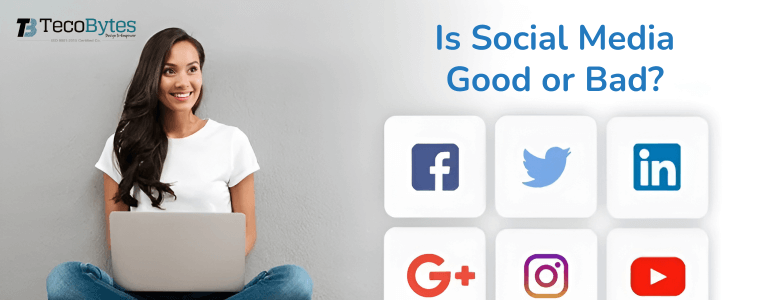Social media has become an integral part of our daily lives, transforming how we connect, communicate, and consume information. While social media provides significant benefits, such as community building and business growth, it also raises concerns related to privacy, misinformation, and mental health. In this blog, we’ll explore whether social media is good or bad, examine key statistics, and offer practical insights for navigating its complex landscape.
Table of Contents
- What is Social Media?
- The Benefits of Social Media
- Challenges and Potential Downsides
- Navigating Social Media Effectively
- Conclusion: Wrapping It Up

What is Social Media?
Social media refers to digital platforms and applications that enable users to create, share, and interact with content in a virtual community. These platforms, such as Facebook, Twitter, Instagram, and LinkedIn, facilitate real-time communication and information sharing. The global reach of social media has revolutionized how we interact, making it a powerful tool for both personal and professional use.
Key Points:
- Definition & Evolution: Social media has evolved from simple communication tools to complex networks that influence public opinion and drive economic growth.
- Statistics: With over 4.6 billion users worldwide, social media’s influence spans across various demographics and regions.
- Relevance: For businesses and individuals alike, understanding social media is essential in today’s interconnected world.

The Benefits of Social Media
Social media provides numerous benefits that have reshaped communication, marketing, and community building:
- Enhanced Connectivity and Community Building
- Global Reach: Social platforms allow people to connect across geographic boundaries, fostering global communities.
- Support Networks: They offer a space for support groups and communities to flourish, especially for individuals facing unique challenges.
- Business Growth and Marketing
- Cost-Effective Marketing: Businesses use social media for cost-effective marketing, targeted advertising, and direct customer engagement.
- Real-Time Feedback: Companies can gather immediate feedback and adapt strategies accordingly.
- Information and Awareness
- Instant Updates: Social media delivers real-time news and updates, keeping users informed.
- Educational Content: Social media platforms provide educational content through webinars, tutorials, and expert discussion, fostering continuous learning.
Challenges and Potential Downsides
While social media has its merits, it is not without its challenges:
- Privacy and Data Security
- Concerns Over Data: With rising incidents of data breaches and privacy invasions, users are increasingly wary of how their personal information is handled.
- Regulatory Scrutiny: Governments and organizations are pushing for more robust data protection measures.
- Misinformation and Fake News
- Spread of False Information: The fast spread of unverified content can fuel misinformation, shaping public opinion and potentially impacting major events like elections.
- Impact on Public Trust: Continuous exposure to false narratives can erode trust in traditional media and institutions.
- Mental Health and Social Wellbeing
- Addiction and Overuse: Overuse of social media has been associated with mental health challenges such as anxiety, depression, and digital addiction.
- Comparative Culture: The curated nature of social media often leads to unrealistic comparisons, impacting self-esteem.

Navigating Social Media Effectively
Given both the advantages and challenges, it’s essential to develop strategies for using social media responsibly:
- Educate Yourself on Privacy Settings
- Regular Updates: Stay informed about platform updates and adjust privacy settings accordingly ;
- Use Secure Platforms: Consider using platforms that prioritize user privacy and data protection.
- Verify Information Before Sharing
- Fact-Checking: Always verify the credibility of sources before sharing or acting on information. ;
- Reliable Sources: Follow trusted news outlets and experts to ensure the accuracy of the content.
- Balance Your Social Media Use
- Mindful Consumption: Set time limits and take regular breaks to mitigate the risk of digital burnout.
- Engage Positively: Engage in meaningful interactions and limit exposure to content that negatively impacts mental well-being.
Conclusion: Wrapping It Up
Social media is a double-edged sword, presenting both opportunities and challenges in today’s digital landscape. At Tecobytes, our goal is to provide timely tech insights and analysis, leaving it to you to decide how best to navigate and leverage social media’s evolving role.
Ultimately, whether social media is “good” or “bad” depends largely on how it is used. To make the most of social media, stay informed, engage mindfully, and take proactive steps to safeguard your digital well-being.
